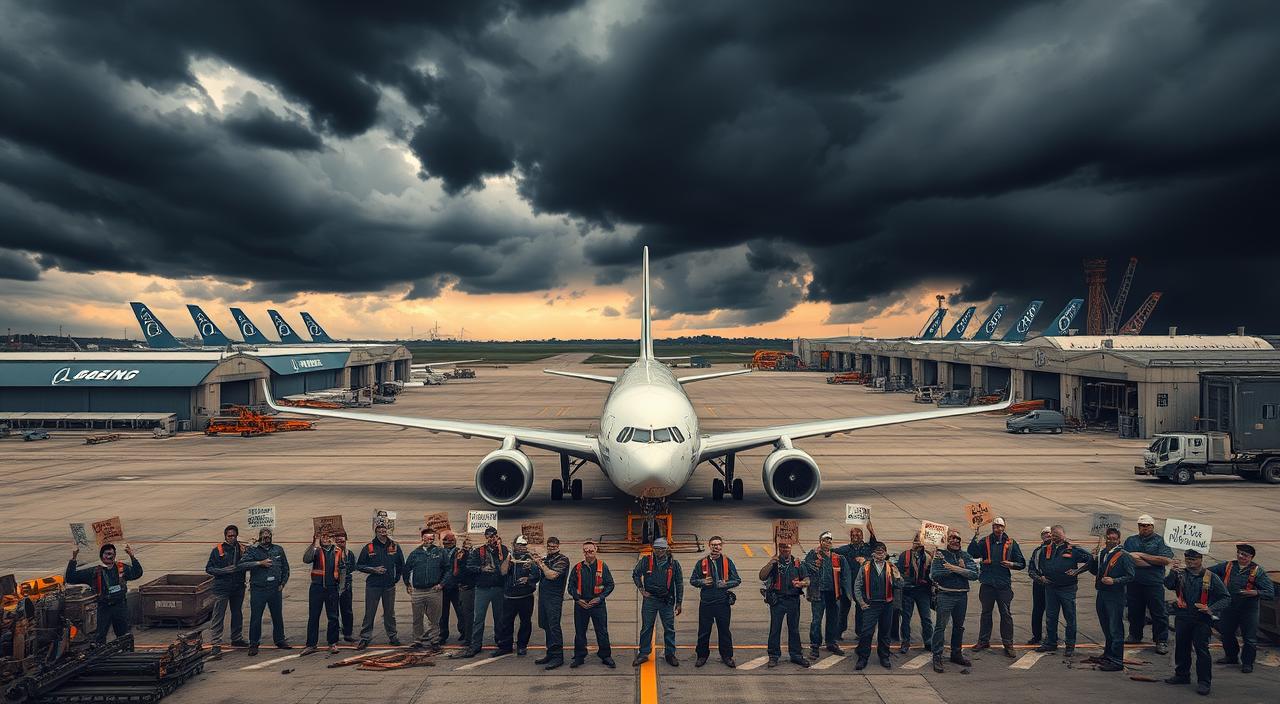Boeing is losing $100 million every day because of a five-week strike. This is the longest strike in the company’s history. CEO Kelly Ortberg is under a lot of pressure, with the company’s future at stake.
The strike’s outcome will decide Ortberg’s future and Boeing’s direction. It’s a critical moment for the company.
Key Takeaways
- Boeing faces a critical moment as workers vote on a new contract proposal during a five-week strike.
- The strike has brought to light deep issues within Boeing, including strained relations between management and workers.
- If the contract is accepted, it could end the strike, boost employee morale, and increase investor confidence.
- Even if the strike ends, it will take time for Boeing to get production back on track. Concerns about quality and safety remain.
- The strike has cost Boeing $1.3 billion, adding to its financial woes.
Striking Boeing Workers Make Earnings a Cliffhanger for CEO
The labor disputes at Boeing have put the company’s leadership in a tough spot. On October 23, workers will vote on a contract that could change Boeing’s future. The proposal includes a 35% wage increase over four years, making the stakes very high.
If workers approve the contract, it could be a turning point for Boeing. It might help the company recover from its financial struggles. The strike has shown deep issues, like bad relations between management and workers. The vote’s outcome is key for Boeing’s stability and operations in the U.S.
The CEO is facing a “cliffhanger” situation. The company’s earnings and future depend on the vote. The strike has disrupted production and supply chains, causing financial problems. The CEO must find a solution that meets workers’ demands and shareholders’ interests.
The aerospace industry often faces labor conflicts, and Boeing’s situation is no exception. The company’s leadership must balance employee compensation, corporate governance, and financial performance. This is to ensure a stable and productive workplace.
| Metric | Value |
|---|---|
| US Stock Futures Drop | S&P futures down 0.3%, Nasdaq 100 futures fell 0.5%, Nasdaq futures slid 0.6% |
| Boeing Stock Rise | Up 3% in premarket trading after union workers struck a tentative agreement raising pay by 35% over four years |
| Other Stock Movements | Humana gained 4%, Cigna shares fell 3%, Piedmont Lithium dropped 5%, Spirit Airlines jumped 38% |
| U.S. Stocks Outlook | Unlikely to sustain above-average performance, with a 23% bounce concentrated in big tech stocks and better returns expected in bonds |
| European Stocks | Stoxx 600 index dropped 0.5%, with fewer positive earnings surprises than usual |
| Asian Stocks | MSCI Asia Pacific Index fell by 0.6% due to drops in financials and consumer discretionary sectors |
| U.S. Dollar | Bloomberg Dollar Spot Index rose by 0.2%, reflecting a spike in demand linked to the U.S. election |
| Commodities | Oil rebounded with Brent crude trading above $74 per barrel, and gold prices rose to a record high |
These market movements and industry dynamics show the high-stakes environment Boeing’s leadership is in. The workers’ vote on October 23 will be a turning point for Boeing. It will have big implications for the company’s future direction and performance.
Boeing’s Labor Dispute: Impact on Production and Supply Chain
The labor dispute between Boeing and its machinists is affecting the company’s production and supply chain. The strike, involving about 33,000 employees, has stopped Boeing’s production plans. It has also reduced the company’s cash reserves.
Halted Operations and Disrupted Supply Lines
The strike has caused 700 workers at Spirit Aero to be furloughed. This is because of a backlog of fuselages for the 737 MAX. The Federal Aviation Administration (FAA) has also limited MAX production to 38 per month. This makes it hard for Boeing to increase production.
Financial Toll of the Work Stoppage
The strike is costing Boeing a lot of money. The company plans to lay off up to 17,000 workers and take on $5 billion in costs. Boeing might also sell some business units to raise cash because of the production drop and strikes.
There’s a 50/50 chance the IAM rank and file will approve the deal with Boeing. The outcome of these negotiations is key for Boeing to get back on track financially and restore production.
| Impact | Details |
|---|---|
| Supply Chain Disruption | 700 workers furloughed at Spirit Aero due to 737 MAX fuselage backlog |
| Production Challenges | FAA limits 737 MAX production to 38 per month, uncertain timeline for increase |
| Financial Toll | Boeing plans to lay off up to 17,000 workers and take on $5 billion in costs |
| Resolution Uncertainty | 50/50 chance of IAM rank and file ratifying tentative deal with Boeing |
Boeing needs to solve the labor dispute to stabilize its production and finances. This is important for the company to overcome the challenges in the aerospace industry.
Negotiations and Contract Talks: The Road to Resolution
The labor dispute between Boeing and its machinists is at a key point. Everyone is watching the vote on Boeing’s new contract proposal. This vote could either help the company recover or make things worse.
Boeing’s latest offer includes a 35% pay increase over four years, up from 30%. The ratification bonus per worker has also been raised to $7,000. But, the union wanted a 40% pay raise, and the new offer is only 39.8%.
Despite not getting their full wage demands, the union agreed to the new contract. This shows they are willing to find a middle ground. It balances the workers’ needs with the company’s financial situation.
If the contract is approved, it could bring financial stability and better morale. It would also reassure investors watching the dispute. But, it will take time for Boeing to fully recover and fix its quality and safety issues.
“Ending the strike is a top priority for Boeing CEO Kelly Ortberg,” as the company reports that the work stoppage has been costing it at least $50 million a day.
The vote on the contract is a critical moment for Boeing’s future and its workers. The outcome could either help the company recover or make things harder. This shows how important these labor talks are.
Executive Compensation and Corporate Leadership Under Scrutiny
Boeing CEO Kelly Ortberg is facing tough times as he tries to solve the labor strike. He needs to please both employees and investors. The vote on the contract will show if Ortberg’s leadership is working and what the future holds for Boeing.
Mounting Pressure on CEO Kelly Ortberg
Kelly Ortberg, Boeing’s CEO, is under a lot of pressure. The strike is costing the company about $1 billion each month. Ortberg must meet the workers’ demands while keeping the investors happy.
Balancing Employee Demands and Shareholder Interests
The new contract offers a 35% pay raise over four years and better 401k plans. It also includes a $7,000 bonus for approval. This deal could boost employee morale but will also watch how it affects Boeing’s finances. Ortberg has to make sure the company stays strong in the long run.
| Key Metrics | Impact |
|---|---|
| $1 billion loss per month due to the strike | Significant financial impact on Boeing’s operations |
| 35% wage increase over four years | Improved employee compensation, but higher labor costs |
| $7,000 ratification bonus | Incentive for workers to approve the contract, but additional financial outlay |
“The outcome of the vote will be critical in determining Ortberg’s leadership and the company’s future direction.”
The Boeing strike has highlighted the importance of corporate leadership and executive pay. Ortberg must balance what workers want with what investors expect. The choices he makes now will affect Boeing’s success and Ortberg’s reputation as a leader.
Aerospace Industry Dynamics and Workplace Conflicts
The Boeing strike is just one example of a growing trend in the aerospace industry. Workplace conflicts and labor unrest are becoming more common. Employees are demanding better pay and working conditions, leading to strikes and production disruptions.
Corporate leaders, like Kelly Ortberg, face a big challenge. They must balance their workers’ needs with the company’s financial goals and shareholder expectations.
Union Negotiations and Labor Unrest
Aerospace industry workers, including Boeing employees, are speaking up for better wages and benefits. Union talks often get heated, with workers going on strike to get their point across. This has affected production and supply chains, as seen in the Boeing strike.
The aerospace industry’s workers are more confident in asking for a bigger share of profits and more control over their work environment. Leaders like Kelly Ortberg must find a way to meet these demands without hurting the company’s finances.
| Aerospace Industry Trends | Impact on Workplace Dynamics |
|---|---|
| Rising labor costs and employee demands | Increased frequency of strikes and work stoppages |
| Globalization and supply chain complexities | Heightened tensions between management and labor |
| Technological advancements and automation | Concerns over job security and work-life balance |
| Pressure to maintain competitiveness | Challenges in aligning employee and shareholder interests |
As the aerospace industry deals with these complex issues, leaders must show strong leadership and be open to talking with their workers. Finding a balance between employee needs and company finances is key to success.
Financial Impacts and Investor Concerns
The Boeing strike has hit the company hard, with a $1.3 billion cash outflow and daily losses of $100 million. These issues have worried investors and credit rating agencies. They are watching closely to see if Boeing can fix its operations and supply chain.
Cash Flow Challenges and Credit Rating Risks
The strike has made Boeing’s cash flow tight, affecting its finances. Investors are watching how Boeing will handle these cash flow issues. The strike’s end and Boeing’s return to production are key to solving these problems and winning back investor trust.
| Metric | Impact |
|---|---|
| Cash Outflow | $1.3 billion |
| Estimated Daily Losses | $100 million |
The strike’s financial strain has also worried about Boeing’s credit rating. This could affect Boeing’s future access to capital and financing. Investors are keeping a close eye on the situation, and resolving the strike is critical for Boeing’s financial health and creditworthiness.
As the strike goes on, Boeing’s financial situation will only get worse. The company’s leaders must find a solution that satisfies workers and investors. The outcome will greatly affect Boeing’s future and its place in the aerospace industry.
Restoring Workplace Dynamics and Corporate Culture
The Boeing strike has shown deep problems in the company’s relationship with its employees. There are big issues between management and workers. Fixing these problems and rebuilding trust is key for Boeing to get back on track in the aerospace world.
Boeing’s new contract offers big pay raises and bonuses. But, the strike by 33,000 workers has stopped production of important planes. This has hit Boeing’s ability to work hard. The company also plans to lay off 17,000 people because of the strike and shutdowns.
Boeing’s offer of a 35% wage hike shows a bigger trend in the U.S. Workers are asking for more pay because of high inflation and living costs. Companies are now looking at their pay and benefits to keep up with the changing job market. This could lead to more spending and growth in different sectors.
It’s very important to invest in a good work environment and employee happiness. This helps keep workers loyal, productive, and financially stable. Boeing needs to work hard to fix its workplace and culture. It must build trust and teamwork between management and employees.
The outcome of the ratification vote will shape labor trends and company strategies everywhere. Boeing can succeed in the aerospace field by fixing the labor issues and focusing on employee relations.
“The strike has highlighted deep-rooted issues in the company’s relationship with its employees, including strained relations between management and workers.”
| Key Developments | Impact |
|---|---|
| Pay raises of up to 35% over four years | Reflects shifts in labor demands across industries |
| Enhanced upfront bonuses of $7,000 per worker | Efforts to address worker concerns and retain talent |
| 33,000 workers on strike, halting production | Significant operational and financial challenges for Boeing |
| 17,000 layoffs announced by new CEO | Further disruption to workplace dynamics and employee relations |
Conclusion: Boeing’s Path Forward and Long-Term Outlook
The vote on Boeing’s contract proposal is a key moment for the company. It could help Boeing recover or make its problems worse. Boeing needs to solve the strike and tackle bigger issues like industry trends and financial health for a strong future.
Boeing’s CEO, Kelly Ortberg, has big challenges ahead. Ortberg must lead the company through the strike and financial issues. The company’s success depends on the contract vote and how quickly it can start producing again after the strike.
Even if the strike ends, it will take Boeing time to get back on track. The company must fix short-term problems and work on long-term goals. This includes managing workplace issues, improving finances, and keeping up with industry changes. The choices Boeing makes now will affect its success in the future.
FAQ
What is the significance of the upcoming vote on the contract proposal for Boeing?
The vote on October 23 is very important for Boeing. Workers will decide on a key contract proposal during the strike. The proposal includes a 35% wage increase over four years.
If workers approve it, it could be a big turning point for Boeing. It might help the company recover from its recent financial issues.
How has the strike impacted Boeing’s production and supply chain?
The strike has greatly affected Boeing’s production and supply chain. Operations have stopped, causing problems in supply lines and a big financial loss.
Boeing has lost $1.3 billion recently. The strike is costing the company $100 million each day because production has stopped.
What are the key challenges facing Boeing CEO Kelly Ortberg as he navigates the strike?
Boeing CEO Kelly Ortberg is under a lot of pressure. He needs to meet the needs of employees and shareholders. Accepting the contract proposal could improve employee morale.
But, the company also has to think about its investors’ financial interests.
How does the Boeing strike fit into the broader trends in the aerospace industry?
The Boeing strike is part of a bigger trend in the aerospace industry. Workplace conflicts and labor unrest are becoming more common.
Unions are pushing for better pay and working conditions. This has led to strikes and production disruptions.
What are the key financial implications of the Boeing strike?
The strike has had big financial effects on Boeing. The company recently lost $1.3 billion and is losing $100 million daily because production stopped.
These losses have worried investors and credit rating agencies.
What challenges does Boeing face in restoring workplace dynamics and corporate culture?
Boeing will face big challenges, no matter the vote’s outcome. The strike has shown deep problems in the company’s relationship with its employees.
There are strained relations between management and workers. Fixing these issues and rebuilding trust is key for Boeing to move forward.

My name is Jakir, I am a content writer, content creator, I give business, sports, finance, trending news and I have 10 years of experience in this and this is my blog goldennews24.com.










